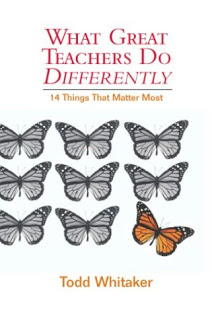
I’d had my eye on this title for awhile, and when I spotted it in the exhibition hall at the ASCD conference, I couldn’t leave without it. I explained my intentions to read the book and blog about it to the publisher reps, and Eye on Education kindly gave me a review copy.
Personal efficacy has been a major theme with me lately, and I’ve been devouring any resources I can get my hands on. So what makes author Todd Whitaker an expert? He’s a former teacher and principal who now works with over 50 schools a year as a consultant, and he’s participated in five research studies on the effectiveness of school principals. He knows great teaching, and he knows that great teaching is not about knowing. It’s about who we are, and what we do. This book is not about presenting a cookie-cutter approach to success, but, in Todd’s own words, “shows the framework that sustains the work of all great educators.”
This was an incredibly readable book that I finished cover-to-cover on a short flight from Richmond to New York. Whitaker gets right to the heart of the matter, breaking down 14 qualities of effective teachers in a manner that is at once knowledgeable and relatable. He makes a number of insightful points that really resonated with me:
When a student misbehaves, the great teacher has one goal: to keep that behavior from happening again. The least effective teacher often has a different goal: revenge.
He notes that an effective teacher only pulls from his bags of tricks a few times a day, but less effective teachers are constantly reaching desperately for something that works, and when that happens enough times, the teacher is “bound to pull out something ugly”.
Whitaker decries the assumption that great teachers are the ones who have high expectations for students:
Even the worst teachers have high expectations for students. They expect students to be engaged no matter how irrelevant the material is. They expect students to pay attention no matter how boring and repetitious their classes are. They expect students to be well behaved no matter how the teacher treats them. Now those are high expectations.
What really matters, Whitaker argues, is the expectations teachers have for themselves. He notes the importance of focusing on the one thing the teacher can control–his or her own performance. Great teachers filter out the negative and focus on the positive. They work hard to create a comfortable and supportive learning environment, and actively seek to repair damaged relationships.
And great teachers focus on real student learning and keep standardized testing in perspective–no excuses about the mandates from on high. Whitaker suggests teachers ask themselves:
What determines what happens in my classroom–the syllabus or the students? Do I hold up the standards at the finish line and watch the students make their way down the track as best they can–or am I at their sides, helping them develop the skills they need? Great teachers know the difference.
A few critics have dismissed What Great Teachers Do Differently: 14 Things That Matter Most as lacking practicality. I attribute that to the tendency in education to look to another program, another quick fix…that search for one miracle quality we can instill in all teachers to make them great, as if teachers were robots to be programmed. But Todd Whitaker understands that great teaching is about forming great relationships. Effective teachers understand that people, not programs, are what ensures success. As Whitaker concludes,
If everyone in a school is treated with respect and dignity, you may have nothing special. However, if everyone in a school is not treated with respect and dignity, you will never have anything special. Of that I am sure.

Angela Watson
Founder and Writer
Sign up to get new Truth for Teachers articles in your inbox
Discussion
Leave a Reply
OR

Join our
community
of educators
If you are a teacher who is interested in contributing to the Truth for Teachers website, please click here for more information.
















I also read this book a few years back, I think it was required reading for a staff development session or something. This is one of those rare books that really “spoke” to me. It was filled with validations and put into words what I knew in my heart to be true. I was nodding my head throughout the book, I couldn’t put it down. A real “must read”.
I can’t wait to read this book. Thanks for your post.
I read this book a few years ago, and it didn’t do much for me, partly because of the criticism that you mention above concerning “practicality.” But it was more than that – a lot of the ideas seemed vague: what does “reaching into one’s bag of tricks” really mean? What constitutes “treating others with dignity and respect” or being “at their sides, helping them develop the skills they need”? I’ve been meaning to give the book another try, though, and your post has inspired me to take a second look.
I’ll have to get ahold of a copy of this book for the summer. It’s been a hard year, trying to get my plans and attitude under control and keep in compliance with all the mandated stuff we have to do (testing, etc). I could use some inspiration 🙂
We were given a copy of this at my new teacher orientation in the fall of 2007 (I was only new to having a full time contract — I had taught before). I didn’t read it because I had no time (got hired in November)…this year I love my kids but not my admin so perhaps its time I pull it out for some inspiration because I seem to be letting the BS on high get me down.